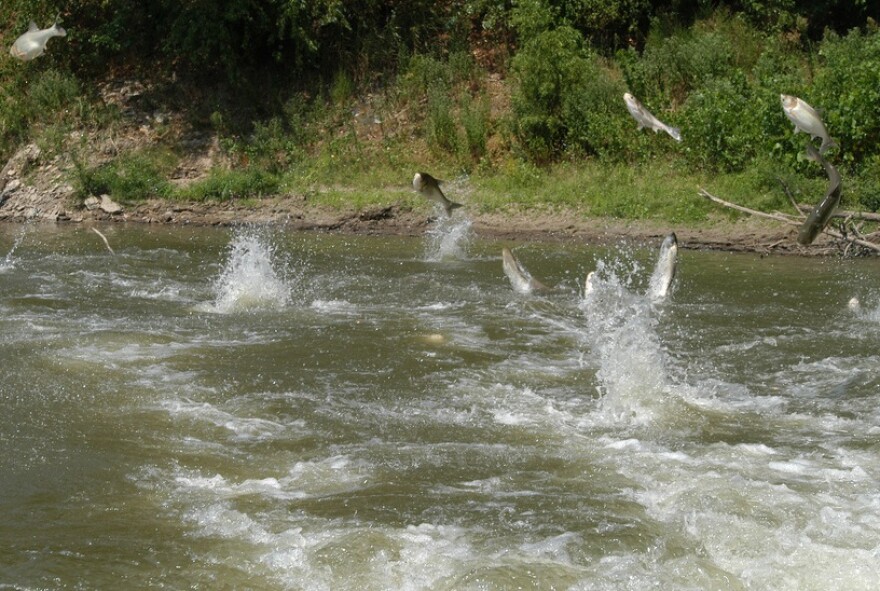Asian carp are wreaking havoc on rivers across Indiana – most recently in Monroe County.
The invasive species has been detected in Salt Creek, sparking fears that the fish will make their way into nearby Lake Monroe. The Department of Natural Resources is alerting fishermen to try and prevent that from happening.
But if Asian carp do end up in Lake Monroe, there’s not much the state can do to get rid of them.
It’s a peaceful day on the Wabash River in Terre Haute. The sun is shining, the water is calm. But when I step on to Brendan Kearns’ boat, he has one word of advice -- Duck.
"It's annoying," he says. "You could be having a peaceful moment on the river and all of a sudden you can get smacked with a 12 lb. fish on the head."
Kearns is pretty good at getting a kind of Asian carp called silver carp to put on a show. The theory is they jump out of the water when they’re bothered by unusual vibrations, like the motor on his boat.
"What I'm doing now is I'm irritating them," he explains. "I've got the motor up a bit and I'm making them more nervous than they actually are."
It can be easy to feel on edge while on the Wabash with Kearns – fish are flying past or into your head and occasionally one ends up in the boat. That’s why he doesn’t bring many people out here anymore.
"I love taking people on the river but we have to be very careful," says Kearns. "We've been in a couple situations where we've been on this boat running about 40 to 50 miles per hour and silver carp would be going past your head."
Several years ago, Kearns shot a video and uploaded it to YouTube. The camera shoots the scene behind his boat, where hundreds of Asian carp are jumping out of the water.
Now imagine that happening somewhere like Lake Monroe.
"I think silver carp could kill recreation on all those lakes," says Kearns.
The Indiana Department of Natural Resources is worried about that possibility, too. They recently discovered Asian carp in Salt Creek, just below the Lake Monroe dam – and DNR wildlife biologist David Kittaka says it’s not the first time it’s happened.
"We've had reports of Asian carp actually jumping and anglers that have been fishing in the tail waters have actually sent us videos as early as 2010," he says."
There hasn’t been much success with containing Asian carp in Indiana’s rivers and scientists are still struggling to figure out the best way to do so. Purdue University Aquatic Ecology Professor Reuben Goforth says other states have installed control mechanisms like electrical barriers to try and prevent the carp from spreading.
"One of the areas of research in my lab is looking to improve electrical barrier technologies, because there are some issues with current configuration in terms of fish being able to get through."
If the invasive species was to make its way into Lake Monroe – it could be there to stay.
Asian carp reproduce rapidly and because the reservoir serves as Bloomington’s water supply, Kittaka says the solutions would be limited.
"You can't drain the lake because it's the water supply for Bloomington, and just the sheer size of it and purpose of the reservoir is for flood control," Kittaka says. "To try and fix a fisheries problem is fairly low priority in terms of what the purpose of the reservoir is."
There is some good news. Goforth says Asian carp haven’t been detected in any of the state’s reservoirs and it would be hard for them to make their way into those large bodies of water on their own.
"Right now, the dams seem to be keeping them out of the reservoirs for the most part."
Goforth says the biggest threat actually comes from anglers. It’s hard to distinguish young Asian carp from popular bait fish, so people could mistakenly introduce the species into lakes.
A state law aims to reduce those chances by prohibiting the possession of live gizzard shad at many of Indiana’s lakes.
"They absolutely look like little gizzard shad," says Gofoth. "They look like native minnows that we have. Sometimes it's hard for experts to tell the difference when they're really small fish. And so the best thing to do is just not do any kind of transfer of fish among water bodies ever."
Because Asian carp is still relatively news to the U.S. Goforth says it’s not clear what impact the fish have on the rivers they take over. There are so many factors at play in a river ecosystem that it’s hard to tell if deteriorating quality of plant life and other fish are directly caused by the presence of Asian carp.
"There's no sort of silver bullet at this point saying if the carp are here, this is what they will do. That's sort of the Holy Grail at this point in terms of research."
Back on the Wabash in Terre Haute, the fish haven’t stopped Kearns from spending time on his beloved river.
And, he has his own ways of learning to cope with the carp.
"What I like to do in areas like this, I like to get them to jump and they get stuck in trees," says Kearns.
You can actually eat Asian carp, but they’re bony and often don’t have much meat.




